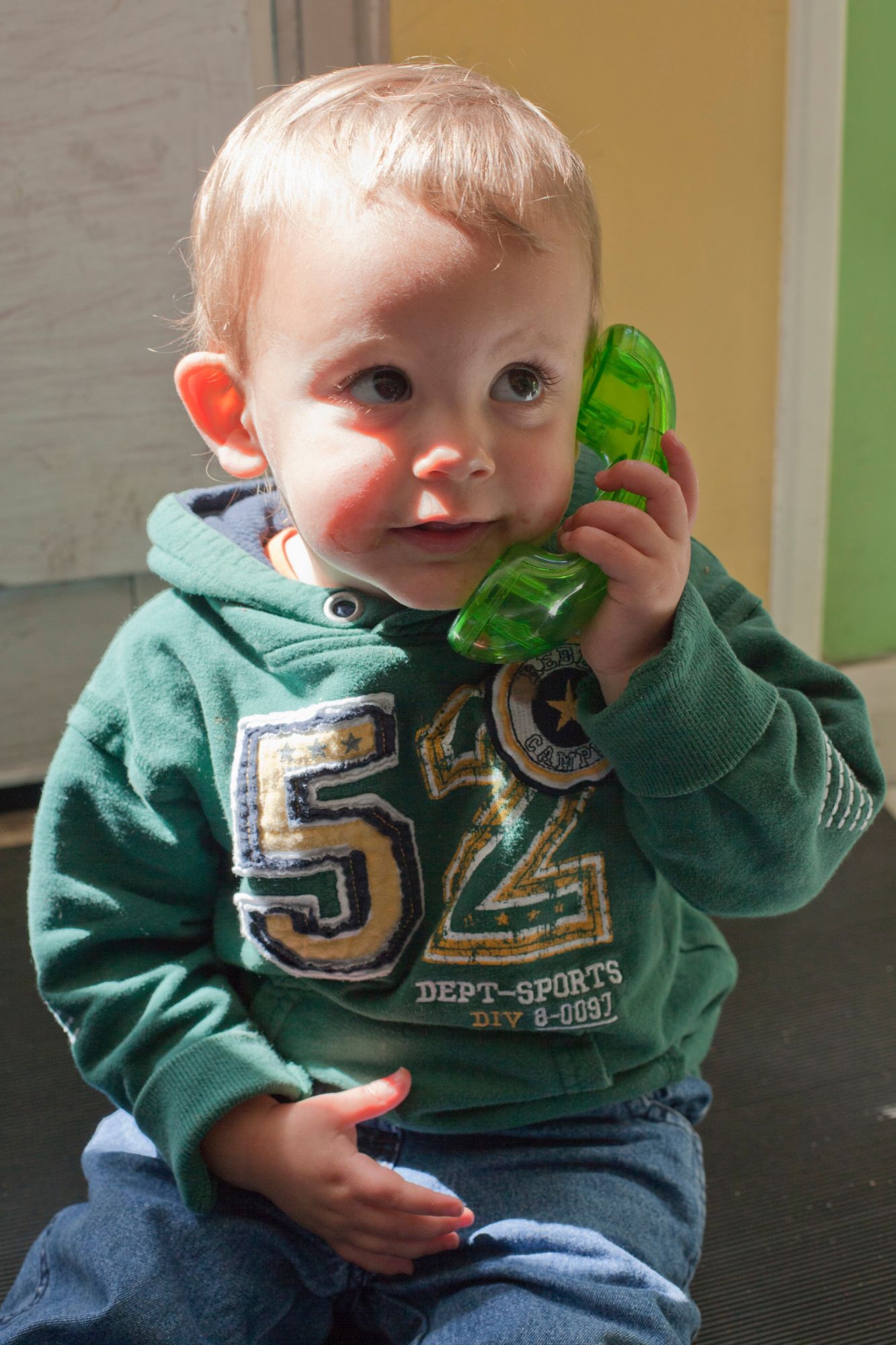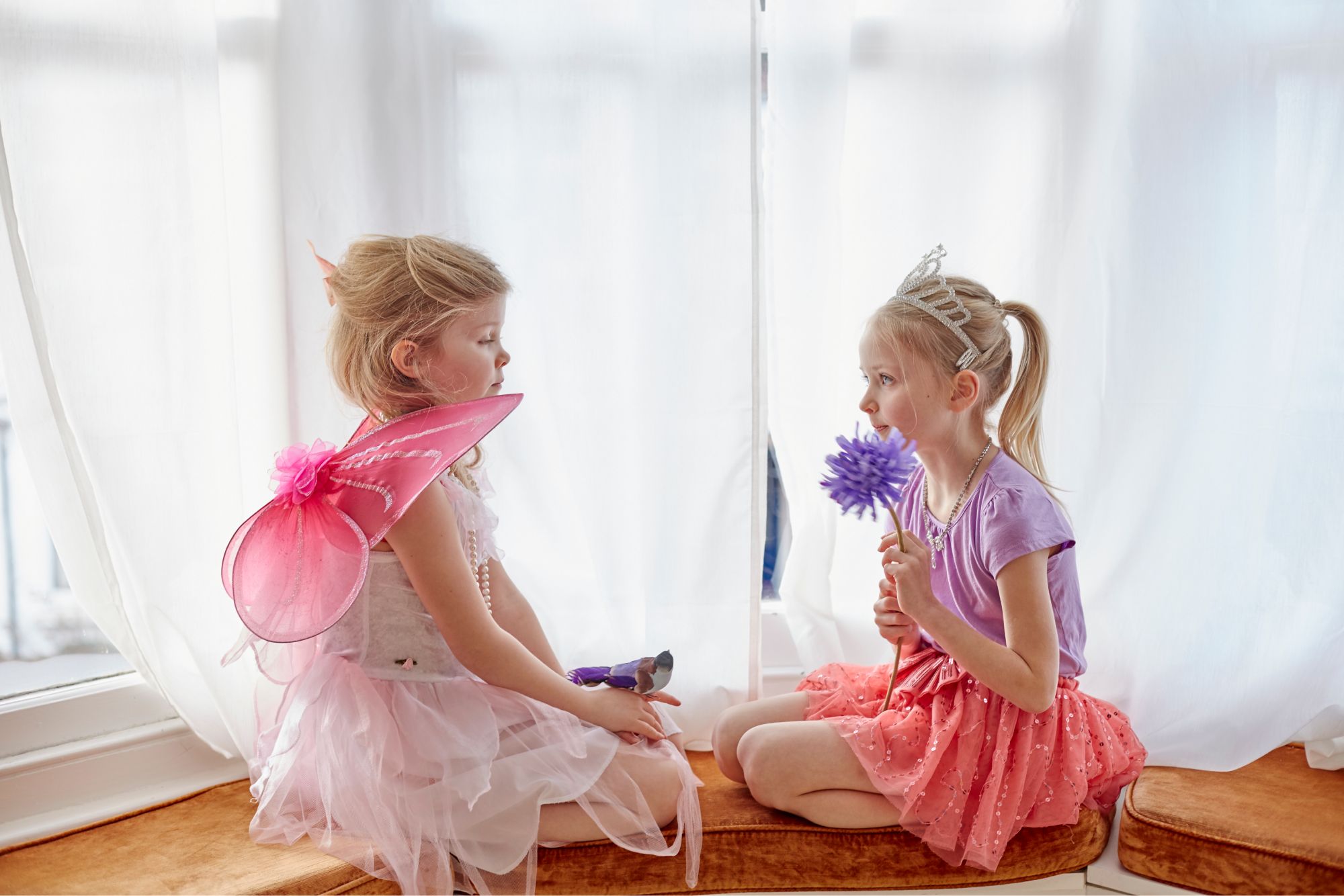
So What Is Pretend Play?

Pretend Play Development Milestones
|
Age Group |
Pretend Play Milestones |
Important Skills Development |
|
12-18 months |
Simple, imitative actions like pretending to eat or drink, using a comb or talking on a toy phone. Using realistic objects to imitate everyday activities |
Understanding of everyday actions, early object-use knowledge. Object permanence (understanding that objects still exist even when not in sight), imitation and motor coordination as they begin to replicate familiar actions. |
|
18-24 months |
Pretend play expands to simple sequences, like pretending to cook, feeding a doll, and then putting it to sleep. Use of toy objects for their intended purpose (a toy spoon for eating), some creative object substitution (a block as food). |
Understanding sequences of actions, emerging symbolic thought (using objects to represent others). Cognitive flexibility and sequencing skills, which form the foundation for more complex play later. |
|
2-3 years |
Role-playing simple scenarios (e.g., pretending to be a parent). Using objects to represent others (e.g., using a block as a phone, a box as a car). Using everyday items in pretend scenarios and beginning to assign roles to themselves or others. |
Symbolic thinking, development of short storylines, early social play with peers. Abstract thinking, as children begin to understand that one object can represent another. Social skills start to develop as they engage with peers in pretend scenarios. |
|
3-4 years |
Engaging in more complex role-playing scenarios. Building stories with beginning, middle, and end while using simple props to enhance the scenario. Starting to assign roles to others & being flexible in role negotiation. Pretending to be a doctor treating patients, teacher instructing students, role-playing with friends in a "family" scenario, recreating favorite TV shows often with imaginative twists. |
Social negotiation skills, cooperation with others in group role play, and storytelling abilities to build narratives. Emotional understanding, this stage also helps with empathy as children take on different characters, roles and perspectives. |
|
4-5 years |
Creation of longer, more detailed scenarios and imaginative stories (e.g., running a restaurant, pirate adventure, space mission, knights and fairies). Using props creatively to build stories. More group play involving multiple children, with some negotiation and following rules such as set roles like patient and doctor. |
Advanced language skills through complex storytelling and verbal negotiation. Understanding of social rules and norms by assigning roles and responsibilities in play. Emotional understanding as they practice empathy and take on various character perspectives. |
|
5-6 years |
Structured group pretend play with defined roles and scenarios Using everyday objects as symbols for imaginative play (e.g., a stick becomes a magic wand or a sword). Incorporating more rules and expectations set by the group. |
Greater creativity in building complex, multi-part stories. Enhanced peer negotiation, social cooperation and teamwork in shared imaginative play, rule based thinking. Emotional regulation and empathy through role-switching and understanding different perspectives. |
|
6-8 years |
Advanced longer role-play with peers or siblings, creating complex storylines with multiple roles (e.g., fantasy play with superheroes, running a community, staging a school play or historical themes). May include invented rules or real-life reenactments (e.g., playing "teacher" or "store"). Using costumes, props, and accessories to make their imaginary worlds more vivid. |
Strategic thinking, teamwork, ability to follow rules while still incorporating creativity. Problem-solving skills as they navigate roles and challenges in their imaginary scenarios. Advanced social skills, including leadership and negotiation during play. Ability to switch roles and perspectives within a story, contributing to emotional understanding. |
|
8-10 years |
Cooperative group play is more refined, with set goals and objectives in collaboration with peers. Creating rule-based games with a mix of pretend and real-world elements (e.g., creating elaborate spy games or role-playing historical figures). Mixing imaginative play with actual knowledge, like creating a “courtroom” scene or enacting a science experiment scenario. |
Higher-level thinking skills, including planning or strategizing, rule-following, and logical reasoning within imaginative contexts. More refined or deeper social interactions, including cooperation, leadership, and conflict resolution. |
|
10+ years |
Pretend play often transitions into organized games, acting in plays or drama club, role-playing games (eg. Dungeons & Dragons), or creative writing. More complex social dynamics and emotional exploration within play. Creating imaginative worlds with friends that blend reality and fantasy in sophisticated ways. |
Advanced social understanding, emotional intelligence, leadership in group activities, and creative storytelling development. Stronger abstract thinking and integrating creativity into other forms of expression, often using writing or art to express imaginative ideas. Leading group play or team activities that involve imaginative storylines. |

When To Seek Help From An Occupational Therapist?
12-18 Months: Early Imitation (Simple Pretend Play)
At this age, children start engaging in simple imitation of familiar routines they observe, like pretending to drink from an empty cup or comb their hair. These early actions are grounded in reality, and they often copy what they see parents or caregivers doing.
When to seek help: If by 18 months, your child doesn’t engage in any form of imitation or struggles to connect toys with actions, such as pretending to drink from a cup.
18-24 Months: Simple Sequences
During this phase, children combine multiple pretend play actions in short sequences. For example, they might pretend to feed a baby, then put it to sleep or combine actions like "cooking" food in a toy kitchen.
When to seek help: If your child doesn’t show interest in putting multiple actions together or has difficulty engaging in this type of pretend play by 24 months.
2-3 Years: Role Play and Symbolic Play
This stage is marked by the emergence of symbolic play, where objects are used as stand-ins for something else, and role-play activities become more common. For example, a child may use a banana as a phone or pretend to be a teacher, parent, or superhero.
When to seek help: If by 3 years old, your child isn’t engaging in any symbolic play (e.g., using objects creatively) or struggles to pretend independently.
3-4 Years: Role Play and Story Building
By ages 3 to 4, pretend play becomes more structured as children begin to develop storytelling and role-playing skills. They now enjoy creating scenarios, taking on various roles, and using their imagination to solve problems within those play contexts.
When to Seek Help: If your child consistently struggles with peer interaction, avoids or lacks interest in social pretend play or lacks flexibility in roles (e.g., insists on repetitive or overly rigid scenarios without imaginative development).
4-5 Years: Imaginative Play and Rule-Following
Between the ages of 4 and 5, children's pretend play becomes increasingly imaginative and starts to include more defined roles, rules, and stories. They begin to structure their play around specific characters and settings, often modeling after real-life experiences or media they’ve
When to Seek Help: If your child has difficulty engaging with others in pretend play or avoids it altogether. If their play lacks complexity or they’re unable to create diverse roles, relying solely on repetitive themes or scenarios.
5-6 Years: Expanding Imagination and Group Play
Children ages 5 to 6 become even more creative in their pretend play, developing increasingly complex storylines and involving more peers. They enjoy using props and costumes to bring their imagined worlds to life.
When to Seek Help: If your child consistently avoids playing with others, doesn’t engage in imaginative play, or shows difficulty understanding or joining in on complex social pretend play.
6-8 Years: Advanced Storytelling and Role-Switching
At this stage, pretend play shifts into more organized, sophisticated forms. Children in this age group can create elaborate, realistic storylines and manage multiple roles within a single game.
When to Seek Help: If your child struggles to understand social cues, fails to engage in organized play with peers, or cannot stay focused on imaginative play for a reasonable period.
8-10 Years: Rule-Based Play and Story Integration
By ages 8 to 10, pretend play may become more rule-oriented. Children are capable of creating games with complex rules and incorporating elements of fantasy, history, or even logic into their play.
When to Seek Help: If your child avoids imaginative play entirely, has difficulty following the agreed-upon rules, or consistently struggles with social play.
10+ Years: Creative Writing and Social Play
As children enter their pre-teen years, pretend play often evolves into creative writing, complex role-playing games, or structured activities that include storytelling with social interactions.
When to Seek Help: If your child is isolated from peer play, shows signs of struggling with creativity, or avoids imaginative tasks altogether.
Conclusion:
References:
Bergen, D. (2002). The Role of Pretend Play in Children's Cognitive Development. Early Childhood Research & Practice, 4(1).
Lillard, A. S., Lerner, M. D., Hopkins, E. J., Dore, R. A., Smith, E. D., & Palmquist, C. M. (2013). The Impact of Pretend Play on Children's Development: A Review of the Evidence. Psychological Bulletin, 139(1), 1–34.
Ginsburg, K. R. (2007). The Importance of Play in Promoting Healthy Child Development and Maintaining Strong Parent-Child Bonds. Pediatrics, 119(1), 182–191.
Case-Smith, J. & O'Brien, J. C. (Eds.). (2014). Occupational Therapy for Children and Adolescents (7th ed.). Elsevier Health Sciences.

Find Out More
Explore how our occupational therapy services can empower your child to reach their goals.